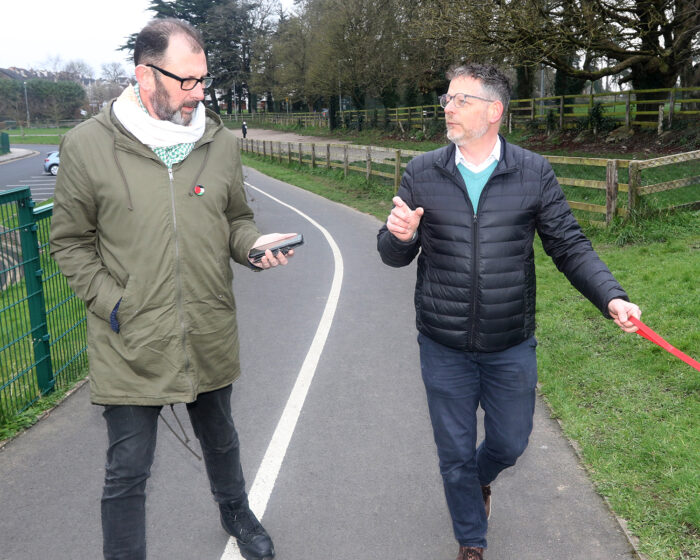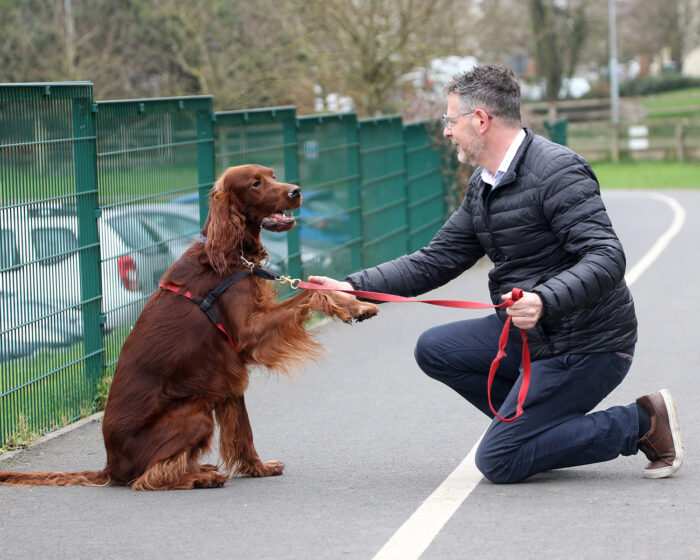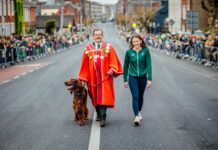
FORMER Land Development Agency (LDA) boss John Moran struck me as a bona fide visionary when I met him recently for the first time. The 57-year-old Mungret-Patrickswell man, who served as Secretary General at the Department of Finance, is on a compelling mission to secure a bright Limerick future.
Moran is a real force of nature, driven by a great vision and an overwhelming passion to do the best for his native city.
That said, after a walk around Mungret Park with the Limerick mayoral candidate, I am about ready for a little lie down.
He comes at me with an imaginative mindset that is hardwired and never switched off. He thinks fast, on his feet, and always outside the box. It’s like being hit by a tornado.
John is accompanied by his lively Irish Setter, Henri, who barks, bounces, and darts excitedly as we make our way around the grounds of Mungret Community College. His beloved pet is almost like a mirror image of Moran’s intuitive brain, always on the go, searching for the next stick, or in his case, conundrum, to sink his teeth into.

A dramatic change
As the conversation is moved to the role of mayor, the Independent candidate gets about as animated as his faithful canine companion when it first spotted the dog park.
“It’s the most important position in local government reform since we had the State. We’ve never had this role before, so people need to understand just how powerful the role actually is. And even stuff that the mayor can do and the mayor can’t do, that takes a bit of a debate. I just felt, if I don’t put my name forward, this will happen without anybody knowing,” he tells me, as Henri yelps for attention and I try to catch my breath.
“Nobody knows what the role is. They have a sense that it might be like the last mayor, but of course it is completely different. But then when you get into debating, you realise they are in charge of a billion-dollar budget. It’s your job to go – not the TDs anymore – to advocate for Limerick in Brussels and in Dublin.”
I cut in and suggest, much to Moran’s chagrin, that the directly-elected mayor (DEM) may be nothing more than a puppet on a string for central government.
“I don’t agree with that,” he insists. “I think this is going to lead to dramatic change in the role of councillors and the role of TDs. It’s in the context, if you think about it.”
‘You have to be an all-Limerick candidate’
Henri, who is eyeing up the other pooches in the dog park, is not getting John’s full undivided attention and he doesn’t like it, he yaps disapprovingly at his master.
“Henri calm down. I know you want to go and say hello to them,” he tells him.
“For me, I think the issue about the role is that it is not understood,” Moran says, picking up right where he left off.

“This is the first time that a population of an area are picking somebody to represent them. You are not representing 15 per cent or 20 per cent of the population – the way our TDs do – and importantly it’s all of Limerick. You cannot be a city candidate or a county candidate, you have to be an all-Limerick candidate.”
John takes the view that Limerick’s first DEM must operate with real integrity and transparency if they are to be a mayor for every person in the city and county. He is very passionate about Limerick and it oozes out of every pour as he talks about its untapped potential and the opportunities ahead.
“On the mayor’s shoulders will be pivotal decisions which will have consequences for decades in our county. Make those correctly and the future will be bright. Get them wrong and we will slip further behind other areas in Ireland.”
“When you end up needing something for Limerick, whatever it might be, there’s a couple of things that happen because of that,” he tells me.
“First of all, councillors are appointed typically to represent people in one of the six areas, relatively small areas. The mayor has to look out for everybody, so they have to be able to find the consensus when they need to get the councillors to agree. Whereas the current mayor is a councillor, who actually represents an area, and of course he changes every year.”
‘That’s the model’
As he stops momentarily, to settle Henri, a lady in the dog park stops to gaze at the well-loved critter.
“Ah, look at the beautiful dog,” she coos.
“Thanks, he wants to be in there, but we are just going for a walk,” John explains.
As our photographer stops to take shots of John with his beloved pet, the compliments keep coming.
“I was just admiring the model,” a jogger blurts out as she passes us.
“That’s the model,” John replies, pointing at Henri.

Getting back to the point at hand, he tells me “there’s a lot of fear around the role, that’s why, for me, it’s hugely important that we have a proper debate about this. I don’t think most people realise some of the fundamental parts. The first one is — it’s all about money, right?”
“To get anything done in a country, it’s all about money and politics. So we’ve now combined money and politics in the same place. That to me is an impactful gift, because at the moment we have a bunch of full-time officials that spend all their time going over the budget, like we used to do in the Department of Finance, coming up with options.
“The council have an impossible job because they are trying to figure out how to change that budget. It’s a full-time process, I know because Michael Noonan used to spend full-time with me trying to figure out what the different options were for the budget.
“Before you had all these part-time people and the councillors were really only looking out for their own patch – that’s the nature of things, that’s how you get re-elected. Now you have a political representative of all the people of Limerick, who is working full-time to sit with the officials and propose how the budget will work based on the priorities that the people of Limerick chose when they elected that person. That’s a complete transformation.
The DEM, Moran insists, will have a “foot in the door” and be a direct link to central government, able to speak directly to Ministers in Dublin on the issues of the day, be that housing, health, or transport.
“I remember when I was Secretary General at the Department of Finance, the head of the IDA wasn’t supposed to talk to me. The mayor has a direct line to anyone they want. Now we have a reason to do things differently in Limerick. We are the only city with a directly-elected mayor who now has the ability to stand in front of somebody and get things done.”










